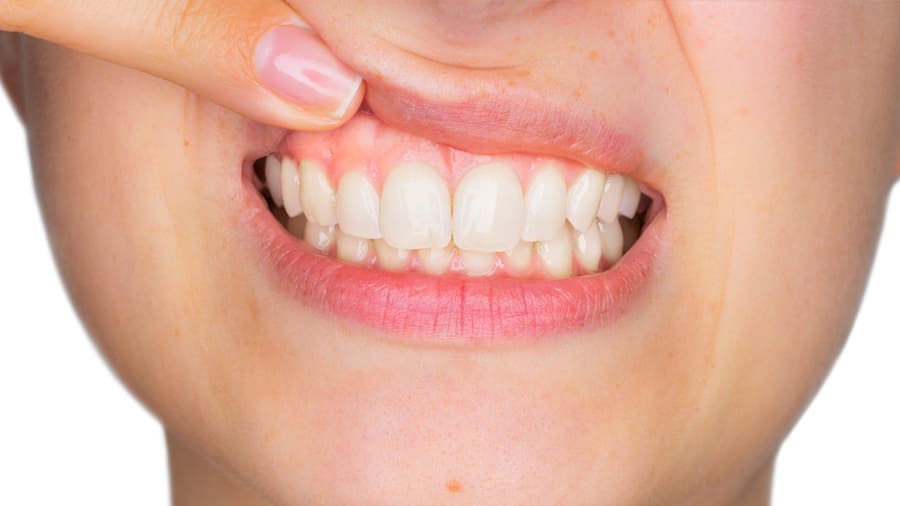Continue reading to learn about periodontal disease, including its major causes, stages, symptoms, and risk factors. Also, the treatment options, prevention strategies, and when to consult a dental professional for early detection and effective management. You can maintain good oral health and well-being by properly understanding these aspects.
What is Periodontal Disease?
Periodontal (gum) disease is an infection that affects the tissues supporting the teeth. The term “periodontal” means “around the tooth” and includes the periodontium, comprising the gums, ligaments, and bones surrounding each tooth. One of the main causes of periodontal disease is poor oral hygiene. When people do not clean their teeth properly, plaque (a sticky film of bacteria) can build up on the teeth. Over time, this plaque can harden and lead to serious dental problems.
This bacterial infection can damage the structures that hold your teeth in place, including the gums, periodontal ligament, and alveolar bone. If not treated, periodontal disease can advance into periodontitis, resulting in tooth loss. The disease can progress in different ways, and its severity can vary depending on the specific form of gum disease present. For these reasons, early detection and treatment are important to prevent serious side effects from periodontitis.
What Causes Periodontal Disease?
Periodontal disease can arise from several factors, with poor oral hygiene being one of the most significant factors. When dental plaque accumulates on the teeth and is not removed properly, it can harden into tartar. The plaque buildup can lead to infection and inflammation in the gums, damaging the tissues and bones that support your teeth. Over time, this may even cause the gums to recede from the tooth surfaces.
In addition to inadequate oral care, other risk factors in the periodontal disease causes include:
Vitamin Deficiencies: Lack of vitamins C, D, and K can weaken gum health.
Teeth Alignment Issues: Misaligned or overcrowded teeth, as well as the use of braces or bridges, can make it difficult to maintain good oral hygiene.
Teeth Grinding: Habitual grinding or clenching of teeth can put extra pressure on the gums and teeth.
Medications: Certain medications may affect oral health and contribute to gum disease.
Health Conditions: The relationship between diabetes and periodontitis and other diseases like cardiovascular issues is high and can increase the risk of developing periodontal disease.
Stress: High stress levels can impact overall health, including oral health.
Hormonal Changes: Fluctuations during puberty, pregnancy, or menopause can affect gum health.
Understanding What Are The Stages of Periodontal Disease
If you are wondering what are the stages of periodontal disease, it mainly includes three phases: gingivitis, periodontitis, and advanced periodontitis. Here is a closer look at each of these stages:
Gingivitis: This is the first stage of gum disease. It shows symptoms like red and swollen gums, bleeding while brushing or flossing, a receding gum line, and bad breath. Being the early stage, gingivitis is common and can be reversed with good oral hygiene.
Periodontitis: In this stage, the soft tissues around the teeth are damaged, and the supporting bones begin to break down, which can eventually result in tooth loss. Symptoms of periodontitis include swollen, bright red gums, tenderness, the formation of pockets between the teeth, pus between the teeth and gums, bad breath, and loose teeth.
Advanced Periodontitis: This is the final and most severe stage of gum disease. At this point, teeth can shift and become loose. Symptoms include chronic bad breath, swollen and bleeding gums, severe gum recession, deep pockets between the teeth, and misaligned teeth.
Common Symptoms of Periodontal Disease
In the early stages, you might not notice any symptoms of gum disease. However, as the condition progresses into more advanced stages, you may experience significant pain. Here are some common periodontal disease symptoms:
Red, swollen, or tender gums: You may experience inflamed, sensitive, and bleeding gums.
Gums pulling away from the teeth: You might notice that your gums are receding, exposing more of the tooth.
Increased tooth sensitivity: You may feel discomfort, especially around the gum line, due to tooth sensitivity.
Loose teeth or difficulty while chewing: As the disease advances, teeth can become loose, making eating painful.
Persistent bad breath or an unpleasant taste: You may experience ongoing bad breath or a bad taste in your mouth.
Risk Factors For Developing Periodontal Disease
If you are wondering, is periodontal disease contagious? The answer is yes. It can spread from person to person through saliva. Apart from that, several other factors can increase the risk of developing it. Below are some key risk factors to be aware of:
Lifestyle Factors: Smoking and tobacco use are major risk factors for the progression of periodontal disease. They weaken your body’s ability to fight infection, worsening the condition. Stress can also make it harder to fight off gum infections. Poor nutrition and obesity further increase the risk of gum disease by lowering your body’s ability to heal.
Diseases: Systemic diseases like diabetes, cardiovascular disease, rheumatoid arthritis, and other such health conditions can weaken your immune system, making your gums more vulnerable to infection. If you have any of these conditions, it is important to let your dentist know your medical history so they can closely monitor your oral health.
Age and Heredity: Your genes can make you more likely to get gum disease. In the same way, as you get older, the chances of developing periodontitis are higher.
Treatments For Periodontal Disease
If you are dealing with periodontal disease, you may want to know about the treatment options available for it. Periodontal treatment generally depends on how severe the condition is. Here are some common gum disease treatment approaches:
Scaling and Root Planing: For mild cases like gingivitis, non-surgical treatments can help you restore healthy gums. Scaling involves deep cleaning to eliminate plaque and tartar from above and below the gum line. Root planing complements this process by smoothing rough areas on the tooth roots to prevent bacteria from accumulating, facilitating healing, and allowing the gum tissue to reattach.
Periodontal Gum Surgery: If the pockets around your teeth become too deep for effective cleaning of the root surfaces through regular brushing and dental visits, a pocket reduction procedure might be required. In this surgery, the periodontist (gum specialist) measures the depth of the pockets and makes small incisions in your gums to lift back the tissue, allowing for better scaling and root planing. This process helps the gum tissue reattach firmly to the teeth.
Gum Grafting: When periodontal disease causes significant gum recession, tissue grafting may be necessary to reshape the gums or to graft new tissue over exposed tooth roots. Typically, the periodontist takes tissue from the roof of your mouth and places it over the exposed areas to protect the roots from decay, bone loss, and further recession.
Regenerative Procedures: If periodontal disease has harmed the bone that supports your teeth, guided tissue regeneration techniques like bone grafting can help repair the damage. The periodontist first removes any bacteria around the root, then grafts bone around the affected tooth to stimulate the regeneration of lost bone and tissue. With enough bone restoration, you might later qualify for dental implants if you have lost any teeth.
How to Prevent Periodontal Disease
If you are wondering how to get rid of periodontal disease, remember that while some effects cannot be fully reversed, you can take steps to prevent it from worsening. Here are some effective ways to keep your gums healthy:
Brush Twice Daily: Use fluoride toothpaste and a soft-bristled toothbrush to remove plaque.
Floss Daily: Floss at least once to clean between your teeth to avoid plaque accumulation.
Use Mouthwash: Rinse with an antibacterial mouthwash daily.
Eat Healthy: Focus on eating nutritious foods and limit sugar intake.
Quit Tobacco: Avoid smoking and tobacco products.
Visit the Dentist: Get regular dental checkups and professional cleanings every six months.
When to Consult a Dental Professional
If you notice any symptoms of periodontal disease, it is essential to consult a dental professional for a thorough evaluation. They will examine your gums for signs of infection using a dental probe and may take X-rays to assess any damage to the bone and surrounding structures. Depending on the severity of the case, your dentist may also suggest periodontal treatments to restore your oral health and prevent tooth loss. Regular professional dental cleanings from a dental hygienist can also help control plaque buildup and reduce the risk of further progression.
In conclusion, periodontal disease can lead to significant oral health issues if left untreated after experiencing signs of inflammation. By practising good oral hygiene, seeking early treatment, and consulting a healthcare professional regularly, you can prevent the progression of gum disease and maintain healthy gums. Remember, proper care helps prevent tooth loss and supports your overall health. Stay proactive about your dental health and reduce your risk of periodontal disease through consistent preventive measures.
Frequently Asked Questions
1. Can you recover from periodontitis?
While periodontitis cannot be fully cured, it can be effectively managed with proper care and periodontal treatment. Practising good oral hygiene and scheduling regular dental cleanings can help manage the condition.
2. Will gums grow back after periodontitis?
Gums do not grow back naturally after periodontitis. However, treatments like gum graft surgery can restore lost tissue, and good oral hygiene can prevent further damage.
3. Is periodontal disease contagious?
Yes, the bacteria responsible for gum disease can transmit from one person to the next. Although brief casual contact would not spread it, frequent or prolonged contact through saliva may raise the risk of developing periodontal disease.
4. Can periodontal bad breath be cured?
Periodontal bad breath may go away with proper oral hygiene and deep dental cleaning. However, if you are wondering how to get rid of bad breath from periodontal disease effectively, professional halitosis treatment can help.














